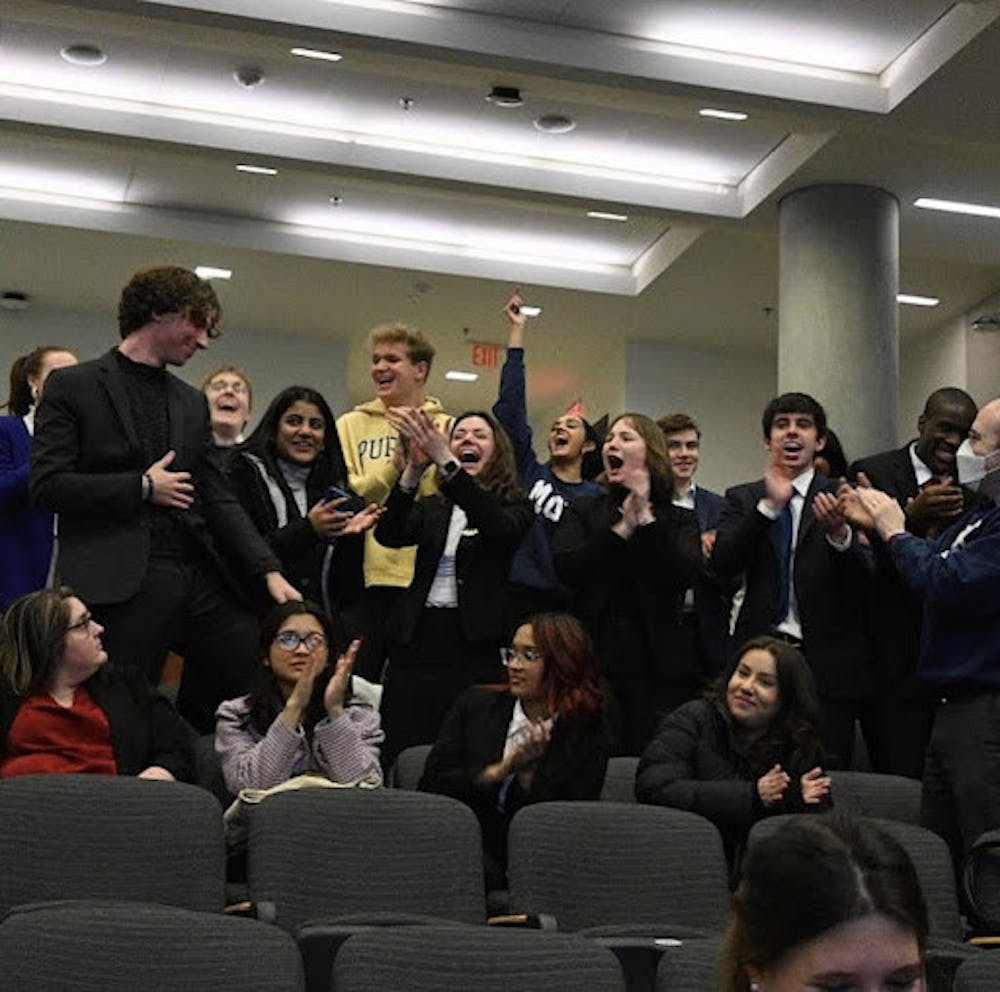American University Mock Trial concluded its spring season after advancing to the 2024 D.C. Open Round Championship Series on March 10.
Mock Trial’s A, B and C teams qualified for the ORCS tournament, which was hosted at George Washington University. The A and C teams won bids to ORCS after going 6-2 and 7-1, respectively, at the D.C. regional tournament hosted at AU. The B Team won a bid after going 7-1 at the regional tournament hosted at Haverford College. Only the A and B teams competed in ORCS due to a limit on how many teams a university can send to the tournament.
At regionals, teams compete in four rounds, where they spend two rounds competing as the defense and two rounds competing as the prosecution or plaintiff. There are two scoring judges for each round and they fill out ballots where they score the teams’ performances. Teams are placed at tournaments based on how many of the eight ballots they won. Overall, a team’s record reflects how many ballots they won and lost.
Throughout the school year, AU’s Mock Trial members enjoyed making memories and testing their debate skills at tournaments. Their fall and spring seasons were full of rigorous practices and team-bonding experiences.
The American Mock Trial Association is the authority for intercollegiate mock trial competitions, and it holds a National Championship Tournament each April. The best teams from the AMTA’s many regional tournaments compete in ORCS tournaments, where they then have a chance to advance to the National Championship Tournament. At ORCS, there are only six bids to the National Championship Tournament.
AU Mock Trial has seen tremendous success in the past few years. During the 2022-2023 season, The club’s A and B teams also made it to ORCS. During the 2021-2022 season, Mock Trial notably competed in the National Championship Tournament, where they ranked 10th in the country.
This year at ORCS, both the A and B teams had a tournament record of 3-5. Despite falling short of a national championship bid this year, AUMT has much to be proud of this season. Aiden McPhillips, the club’s diversity and inclusion chair and a junior in the College of Arts and Sciences and the School of Public Affairs, was especially proud of the club’s participation in ORCS.
“Teams are lucky if they’re able to send one team to the second level of competitions,” McPhillips said. “So, the fact that we had all three, and we essentially had to give up one of our bids … really shows that the talent is dispersed.”
Nidhi Kallur, the club’s treasurer and a sophomore in SPA and CAS, said she was proud of the improvement that the team had shown throughout the season.
“Seeing each of my individual teammates and the results that they provided in the rounds, how fantastically I saw them perform and seeing the growth over the seasons, I think that to me is what's the most rewarding,” she said.
In collegiate mock trial competitions, two teams simulate a criminal or civil trial. Competitors act as attorneys or witnesses, and a panel of judges decides the winner. AU Mock Trial’s teams spend the school year applying their legal knowledge at tournaments across the country. In 2023, the club’s B team finished in first place at Drexel University’s Dragon Invitational.
The SPA-funded program has a six-person coaching staff that is led by head coach Mike Romano. The rest of the staff are a mix of legal professionals and former club members. Romano, a trial attorney at the U.S. Department of Justice and an accomplished former AMTA competitor, has used his experience to help members sharpen their debate skills. Tommy Sear, a team captain and a sophomore in the School of Education and CAS, said he appreciates the coaching staff’s dedication to helping him and other members improve.
“I love working with the coaches,” Sear said. “I feel like most practices I end up staying late with the coaches to help run my direct examinations. The coaches just put so much work into our team because I think they all are equally invested in our successes as the members of the team are.”
James Carney, a senior in SPA, said he is especially thankful for the guidance that Romano and Kierstin O'Hara, an assistant coach and Mock Trial alumna, have given him throughout his collegiate mock trial career.
“They’ve both gotten to know me really well and know my strengths and weaknesses really well,” Carney said. “Mock trial, like any other sort of competitive activity, is one of those things where you can always get better, and it's been great to work with them and go over the little details.”
Collegiate mock trial competitions require extensive preparation, specifically in cross-examinations and opening statements. Annie Flowers, the club’s president and a student in SPA and the School of Communication, said that members prepared for competitions during two weekly practices and individually.
“Outside of that collective practice time, we work on our own elements, whether that's writing a direct examination or cross-examination, an opening-closing statement on our own time,” Flowers said. “We also have office hours with coaches. We are a coached program, so coaches sort of lead those discussions on what theory we're going to run, how we're going to organize practices, in tandem with our captains.”
Parts of members’ individual preparation are dedicated to performance. Attorneys work on presenting their opening statements confidently and witnesses work to play a convincing character.
Meghna Ittycheria, the vice president of external relations and a student in the School of International Service and SPA, said she appreciates the club’s emphasis on performance and acting.
“We focus on different lines and the intonation of that,” Ittycheria said. “So, there is definitely a theater aspect to mock trial. It's kind of like theater and debate and we really do focus on the theater or performance aspect of that when it comes to our speeches or statements as well as whether you're a witness and you're acting.”
Kuhu Badgi, the vice president of internal relations for AU Mock Trial and a sophomore in CAS and SPA, said she values the many skills that she has already developed in her second year with the club.
“As students at AU, many of whom are interested in pursuing a career in the legal field, like in our classes that we take in SPA, I know many of us can say that we already know half of the information because of what we learned on the mock trial team,” Badgi said.
Karran Mehta, the club’s events coordinator and a senior in CAS and SPA, said he believes that good team chemistry contributed to the club’s success this past season.
“Everyone is very motivated,” Mehta said. “Most, if not all the time, everyone gets along with each other. Everyone respects each other. And everyone kind of wants the same thing. They want to improve their skill sets but they also want to show up for their fellow team members and come home with a winning record.”
Carney said that members also spend time together when traveling for tournaments. From exploring new cities to having team dinners, members made sure to build team chemistry outside of the tournament spaces.
Griselda Jesse-Dodoo, the club’s secretary and a sophomore in CAS and SPA, said that how the club views itself as a family plays a part in its good team chemistry and culture.
“Mock trial is an activity that can get really messy, really catty and dirty if people don't want to respect each other,” Jesse-Dodoo said. “But from the very beginning of every season, we stress to each other, we remind each other and to the new members, the importance of respect, the importance of maintaining a good team culture and that means viewing each other as family.”
Correction: A previous version of this article mistakenly referred to Karran Mehta as a junior rather than a senior and incorrectly stated Mehta’s pronouns. The article has been updated to reflect Mehta’s correct year and pronouns.
This article was edited by Kathryn Squyres, Abigail Turner and Abigail Pritchard. Copy editing done by Luna Jinks, Isabelle Kravis and Ariana Kavoossi.





